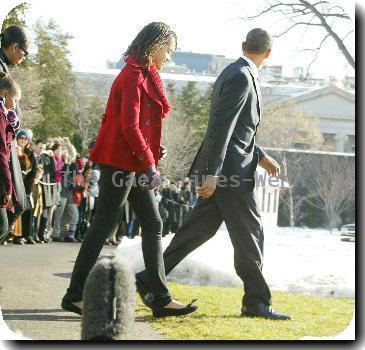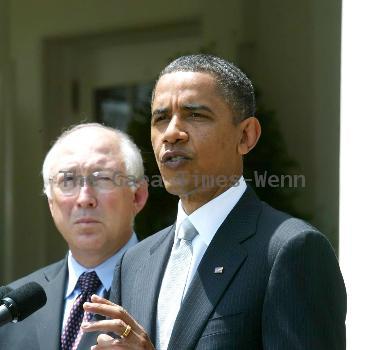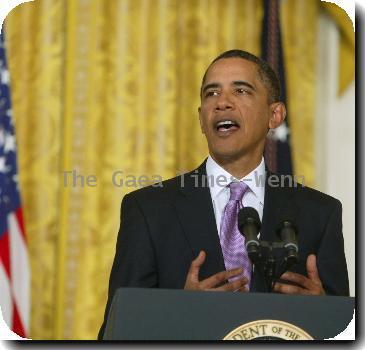Top 8 industrial democracies agree on 5-year Aghanistan exit timeline; slam North Korea, Iran
By Tom Raum, APSaturday, June 26, 2010
World leaders unite in slamming North Korea, Iran
TORONTO, Ontario — Briefly putting aside deep economic differences, top world leaders on Saturday condemned North Korea for the alleged sinking of a South Korean warship, set a five-year exit timeline for Afghanistan and said the standoff in Gaza was “not sustainable and must be changed.”
In a joint statement, the leading eight industrial democracies also criticized both Iran and North Korea for continuing their nuclear march and called on both to heed existing United Nations resolutions.
The statement was not as strongly worded as some nations had hoped, including the United States, particularly in condemning North Korea in the March sinking of the warship. Russia was cited as a holdout against stronger language.
Street protests involving thousands of demonstrators that had been mild earlier turned violent as black-clad demonstrators set fires, including torching a police cruiser in the financial district of Canada’s most populous city and smashed windows in a shopping district after veering off from the planned protest route.
At the summit meeting, the G-8 leaders — representing the United States, Canada, Britain, France, Germany, Italy, Japan and Russia — focused Saturday on foreign policy, where it appeared easier to find common ground. This came after they differed on how best to deal with a struggling world economy.
The leaders are divided on how best to keep the world economy growing after the worst recession since the 1930s. They are generally split between calls, mainly from the U.S., for more government stimulus to keep countries from slipping back into recession, and appeals from European countries and Japan for spending cuts and even tax hikes to avoid Greece-like near defaults.
For now, the leaders have generally cooled their rhetoric and agreed that deficits must be tamed in the long term, but different countries may use different tactics in the short term, depending on their levels of indebtedness.
French President Nicolas Sarkozy told reporters that President Barack Obama “clearly talked about the risks of debt and deficit” in the U.S.
Still, said Sarkozy, “No leader contested the need to cut deficits and debt and to do it in a pragmatic way, taking into account the situation of each country.”
Treasury Secretary Timothy Geithner said world leaders must work together to make sure the global recovery stays on track. Although the world economy has recovered somewhat, many challenges remain, Geithner told reporters.
“The scars of this crisis are still with us,” he said. “If the world economy is to expand at its potential, if growth is going to be sustainable in the future, then we need to act together to strengthen the recovery and finish the job of repairing the damage of the crisis.”
Meanwhile, a senior U.S. official said Obama has decided to resume talks aimed at resolving issues blocking the completion of a free trade agreement with South Korea stalled since 2007 during the administration of President George W. Bush.
The official said Obama plans to announce the new effort after meeting with South Korean President Lee Myung-bak. The official says the goal would be to clear up remaining differences with Seoul by the time Obama visits South Korea in November.
The joint statement from the Group of eight nations, mainly representing older, rich democracies, concluded the group’s two-day meeting at a lakeside resort about 140 miles north of Toronto.
Leaders then immediately returned to Toronto to continue their talks in a broader meeting of the Group of 20, which includes countries with fast-growing economies such as China, India and Brazil.
Obama gave British Prime Minister David Cameron a lift in his helicopter, called Marine One.
In Toronto, Canada’s largest and most cosmopolitan city, police hoped a steady rain Saturday would put a damper on anti-globalization protests, but were bracing for possible violence by splinter groups.
Previous summit gatherings have attracted massive protests by anti-globalization forces. But so far the Canadian protests have been smaller. The largest demonstration, a march in downtown Toronto sponsored by labor unions and dubbed family friendly, was scheduled for Saturday.
The back-to-back summits came amid what Canadian Prime Minister Stephen Harper, the host, called an “enormous crisis facing us all, serious threats to the stability, economic prosperity of every country.”
Leaders were also holding one-on-one sessions on the sidelines of the two summits.
Obama planned to meet separately on Saturday with Chinese President Hu Jintao, South Korean President Lee and Cameron.
It was Obama’s first private meeting with Cameron since the conservative took power last month with a coalition government. Those talks were expected to cover the difficulties posed by the BP oil spill, the biggest offshore oil spill in U.S. history.
The torpedoing of the South Korean warship was certain to be a topic in Obama’s meetings with the leaders of South Korea and China.
The G-8 leaders cited an independent report that found that the ship had been sunk by a North Korean torpedo. The leaders said: “We condemn in this context the attack which led to the sinking of the Cheonan.”
Japanese officials said that Russia was the only G-8 member to resist tougher language condemning North Korea more directly.
An official in the Russian delegation, who spoke on the condition of anonymity because the leaders were meeting, said that Russia still did not consider the results of the investigation to be final and because of this, felt that condemning Pyongyang further could lead to negative consequences.
“We condemned North Korea for its irresponsible behavior,” Sarkozy told reporters.
In their final statement, the G-8 countries also called current restrictions on the flow of goods to Gaza “not sustainable and must be changed.”
“We welcome the decision of the Israeli Cabinet’s announcement of a new policy toward Gaza as a positive development,” the communique said.
And the leaders endorsed a five-year exit strategy on Afghanistan, a timetable first proposed by Afghan President Hamid Karzai last year.
“Clear steps by Afghanistan toward more credible, inclusive and transparent parliamentary elections in September will be an important step forward in the country’s maturing democracy,” the statement said.
The statement also said that a conference in Kabul in July would be an important setting for assessing progress in implementing commitments made in January to train more than 100,000 additional Afghan security forces by the end of next year.
Economic issues were expected to be more prominently debated at the larger G-20 meeting, starting Saturday afternoon, as leaders present conflicting views on how to keep the world economy growing.
“We can’t afford some sort of cataclysmic event” like the 2008 collapse of investment banking giant Lehman Brothers in 2008, said Canada’s Harper.
“We remain very engaged and very watchful of those situations,” he said.
The G-8 communique criticized both Iran’s nuclear program and urged greater adherence to human rights.
“We are profoundly concerned by Iran’s continued lack of transparency regarding its nuclear activities and its stated intention to continue and expand enriching uranium,” the G-8 communique said.
It also praised “ongoing efforts … to persuade Iran’s leaders to engage in a transparent dialogue about its nuclear activities” by China, France, Germany, Russia, Britain, the U.S. and European Union officials. It also praised Brazil and Turkey for their diplomatic overtures to Iran, even those were rejected by other members of the international community. Brazil and Turkey were the only two members of the U.N. Security Council to vote against the most recent set of sanctions on Iran.
Associated Press writers Emma Vandore and Jeannine Aversa contributed from Huntsville, Ontario; Rob Gillies, Foster Klug and Martin Crutsinger from Toronto; David Nowak in Moscow.
Tags: Afghanistan, Asia, Barack Obama, Brazil, Canada, Central Asia, China, East Asia, Eastern Europe, Europe, Events, France, G-8 Summit, Gaza Strip, Greater China, Hu Jintao, International Trade, Iran, Japan, Latin America And Caribbean, Lee Myung-bak, Middle East, North America, North Korea, Ontario, Palestinian Territories, Protests And Demonstrations, Recessions And Depressions, Russia, South America, South Korea, Summits, Toronto, Turkey, United Kingdom, United States, Western Europe, World-summit



